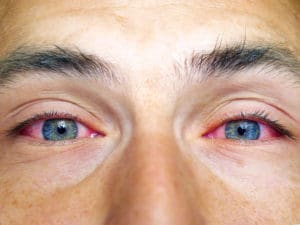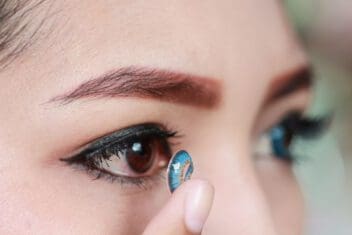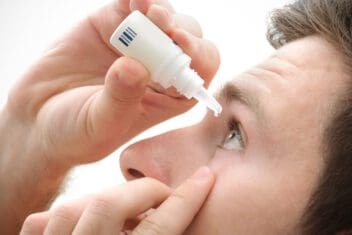Last Updated
Further Reading
- How to Whiten Your Eyes
- Anti-VEGF Treatments
- Medications That Can Affect the Eyes
- Laser Pointers Cause Eye Damage
- Testing for Glaucoma: What Makes a Comprehensive Glaucoma Exam?
- Travel & Eye Health Guide
- What to Know About Tele-optometry
- How to Use Eye Makeup Safely Around Your Eyes
- Understanding Eye Cancer
- Retina Specialists
- Best Senses
- Histology of the Eye
- Is Visine Safe?
- Gunk in the Eyes
- 5 Reasons to See Your Optometrist This Summer
- Why Is It Important to See Your Optometrist Regularly?
- Foreign Objects in Eye: What to Do
- Eye Color Change
- How to Get Rid of a Black Eye
- What Eyes Can Tell About Your Heart Health
- How to Manage Your Child's Screen Time
- Risks & Benefits of Eyelash Extensions
- Pressure or Pain Behind the Eye
- Blood in the Eyes
- Pinpoint Pupils
- Visible Eye Veins
- Why Are Your Eyes Itchy?
- Tired Eyes
- How to Stop an Eye Twitch (Left or Right)
- Swollen Eyelids
- Bumps Under the Eyes
- Eye Pain
- Brown Spots on Eye
- Wildfire Smoke & Your Eyes
- Why Squinting Is Not Bad for Your Eyes
- COVID-19 Omicron Variant and Eyes
- Get Rid Of Bags Under Eyes
- Post-COVID Eye Care Guide
- Splinters or Foreign Objects in the Eyes
- Your Eyes & Epilepsy
- Eye Care for Swimmers
- Eyes Burning?
Bloodshot Eyes: How to Recognize & Treat the Symptoms
Home / Eye Health and Preventive Care /
Last Updated
Bloodshot eyes appear red and irritated. This is a very common issue that people of all ages can experience.
Table of Contents
Numerous factors can contribute to bloodshot eyes. Most often, bloodshot eyes will clear on their own.
In some cases, it might be necessary to visit an eye doctor. It is important to determine the underlying cause, so it can be effectively addressed.
Depending on the cause, doctors may recommend home remedies. Sometimes, medications like eye drops or additional treatments are needed.
What Are Bloodshot Eyes?

When the eyes are bloodshot, the sclera is red. The sclera is the white part of the eye.
For some people, only one eye is affected, while both eyes can be red for others.
The level of redness can range from pink to deep red in color. It may look like multiple squiggly lines on the white of the eye.
In some cases, redness is the only symptom a person experiences. But bloodshot eyes can also be accompanied by one or more of the following:
- Irritation
- Itching
- Pain
- Watery eyes
- Blurry vision
- Burning
- Dryness
- Discharge
- Sensitivity to light
When the eyes are bloodshot, it’s due to an abnormality with the small blood vessels that are on the eye’s surface. When these blood vessels are congested with blood and enlarged, they become noticeable due to the associated redness. This is because not enough oxygen gets to the tissues that cover the eye.
What Causes This Condition?
Most people will experience bloodshot eyes at some point in their life. The majority of the causes are not serious, and most often, people can treat the issue with conservative measures.
There are some more serious medical issues that cause bloodshot eyes as a symptom. These require evaluation and treatment from an eye doctor.
Infections
Infections can cause bloodshot eyes. There are several common eye infections.
- Conjunctivitis is an infection that affects the clear covering of the eye. It is often called pink
- Uveitis is characterized by inflammation of the eye’s uvea, which includes the ciliary body, iris, and choroid. When the iris is infected, the redness tends to be worse compared to an infected ciliary body or choroid.
- Blepharitis is an infection along the eyelid’s edge.
- Corneal ulcers are usually viral or bacterial, but fungi and parasites can also cause this issue. If this infection is not treated, it may lead to severe vision loss, eye loss, or scars on the cornea.
Environmental Causes
Environmental factors can contribute to bloodshot eyes. Dust, air pollution, chemicals, and wind are common causes. Some people develop eye redness due to smoke in the environment.
It is not uncommon for allergies, such as ragweed and pollen, to cause bloodshot eyes as a symptom. Eye strain and fatigue are other possible causes.
Injury
An injury to the eye could cause damage to the blood vessels, resulting in bloodshot eyes. Any trauma to the eye should be evaluated by a doctor to determine the extent of the injury.
Contacts
Contact lenses can cause people to experience bloodshot eyes. There are several reasons why contacts can cause eye redness, such as:
- Allergy to the contact lens solution.
- Corneal ulcer.
- Giant papillary conjunctivitis.
- Dry eye syndrome.
- Contact lenses that are defective or fit poorly.
- Eye allergies.
- Contact lens-induced red eye. This occurs due to a reaction to the toxins that are created by the eye’s normal bacteria. They bind to the contact lens instead of getting flushed from the eye when a person blinks. This is most often seen in people who do not remove their contacts before sleeping.
Medical Conditions
There are also certain medical conditions that might cause bloodshot eyes as a symptom. When the underlying condition is treated, bloodshot eyes usually dissipate as a symptom. These include the following:

- Entropion
- Ectropion
- Glaucoma
- Episcleritis
- Keratitis
- Stye
- Subconjunctival hemorrhage
- Chalazion
- Orbital cellulitis
Are Bloodshot Eyes Reversible?
In most cases, bloodshot eyes will resolve on their own or with treatment, depending on the underlying cause. If eye redness persists, visit a doctor. Some cases simply require stronger treatments than over-the-counter remedies or waiting it out.
Though not common, there are certain causes that can be serious. A doctor can perform the proper testing to determine the underlying cause. This is especially important if bloodshot eyes occur along with other visual symptoms, such as the following:
- Blurry vision
- Swelling
- Eye pus or other abnormal drainage
- Vision halos
- Sudden dryness or burning
Treatment Options
Ultimately, treatment depends on the cause. In most cases, bloodshot eyes are temporary and will alleviate on their own.

Once the underlying cause has been identified, doctors may recommend some home treatments.
- A cool compress may help to alleviate redness and any itching or swelling. Ideally, the compress should be cool and not too cold, or this could worsen the symptoms.
- A warm compress may help. It should be lukewarm or just slightly warmer. If it’s too hot, there is a risk of burning the skin or further irritating the eyes. The warmth helps to increase blood flow to this part of the body. It can also promote more lubrication for the eyes by increasing eyelid oil production.
- Artificial tears may help if bloodshot eyes are the result of irritants or dryness. There are over-the-counter options that doctors usually recommend first. If these are not effective, they may prescribe a more potent option. It is important to follow the administration instructions exactly and never use more than is recommended.
It is not uncommon for contact lenses to cause chronic bloodshot eyes. Doctors might recommend trying a different type or wearing a new pair daily to see if this helps. You may also need to use a different contact solution since you may simply react poorly to a certain brand.
For some people, dehydration can cause bloodshot eyes, so it’s important to ensure proper hydration. Getting enough omega-3 fatty acids may also be beneficial. Some research shows that this nutrient could reduce inflammation, and inflammation may contribute to bloodshot eyes.
Be aware of your surroundings. Since allergies and other environmental factors can cause bloodshot eyes, it is important to know if these are present. If you identify the triggers, you can work to avoid the factors that irritate the eyes the most.
If you have chronic allergies, you might consider these treatments to reduce your symptoms:
- Allergy medications
- Eyedrops to lessen allergy symptoms
- Immunotherapy when allergy symptoms are frequent and significant
If you experience bloodshot eyes that persist or come on suddenly, it is best to see a doctor. They can perform necessary testing to determine the underlying cause. This ensures the right treatment is administered.
Bloodshot Eyes FAQs
How long does it take bloodshot eyes to go away?
This depends on the underlying cause. If your bloodshot eyes are due to an infection like conjunctivitis, the redness will pass within a week or two. If they are due to allergies, they will generally clear within a couple hours of getting away from the allergen.
Most cases of bloodshot eyes will clear within 7 to 10 days.
What can I do to make bloodshot eyes go away faster?
You can help bloodshot eyes to clear faster by placing a cool or warm compress on your eyes, putting artificial tears in your eyes, or using allergy eye drops. Resting your eyes can also help.
What can a doctor do to help my bloodshot eyes?
If your bloodshot eyes are due to a bacterial infection, a doctor can prescribe antibiotics, which can help them to clear much faster. If they are due to an injury or medical condition, a doctor can assess the situation and prescribe appropriate treatments that can aid healing.
Ultimately, it’s a good idea to see a doctor if your bloodshot eyes aren’t getting better within a couple days.
References
- Why Eye Redness Happens and How to Treat It. Healthline.
- Local Heat Increases Blood Flow and Oxygen Tension in Wounds. (February 1987). Archives of Surgery.
- Current Opinion in Ophthalmology Nutritional Supplements for Dry Eye Syndrome. (July 2011). Current Opinion in Ophthalmology.
- Allergies. Mayo Clinic.
- Red Eye: A Guide for Non-Specialists. (April 2017). Deutsches Arzteblatt International.
- Red Eyes: List of Common Causes. (March 2017). Medical News Today.
- Corneal Ulcers and Infections. MedlinePlus.
- Eye Redness. MedlinePlus.
- 7 Reasons Your Contacts Are Giving You Red Eyes. (July 2019). Verywell Health.
The information provided on this page should not be used in place of information provided by a doctor or specialist. To learn more, read our Privacy Policy and Editorial Policy pages.
Further Reading
- How to Whiten Your Eyes
- Anti-VEGF Treatments
- Medications That Can Affect the Eyes
- Laser Pointers Cause Eye Damage
- Testing for Glaucoma: What Makes a Comprehensive Glaucoma Exam?
- Travel & Eye Health Guide
- What to Know About Tele-optometry
- How to Use Eye Makeup Safely Around Your Eyes
- Understanding Eye Cancer
- Retina Specialists
- Best Senses
- Histology of the Eye
- Is Visine Safe?
- Gunk in the Eyes
- 5 Reasons to See Your Optometrist This Summer
- Why Is It Important to See Your Optometrist Regularly?
- Foreign Objects in Eye: What to Do
- Eye Color Change
- How to Get Rid of a Black Eye
- What Eyes Can Tell About Your Heart Health
- How to Manage Your Child's Screen Time
- Risks & Benefits of Eyelash Extensions
- Pressure or Pain Behind the Eye
- Blood in the Eyes
- Pinpoint Pupils
- Visible Eye Veins
- Why Are Your Eyes Itchy?
- Tired Eyes
- How to Stop an Eye Twitch (Left or Right)
- Swollen Eyelids
- Bumps Under the Eyes
- Eye Pain
- Brown Spots on Eye
- Wildfire Smoke & Your Eyes
- Why Squinting Is Not Bad for Your Eyes
- COVID-19 Omicron Variant and Eyes
- Get Rid Of Bags Under Eyes
- Post-COVID Eye Care Guide
- Splinters or Foreign Objects in the Eyes
- Your Eyes & Epilepsy
- Eye Care for Swimmers
- Eyes Burning?